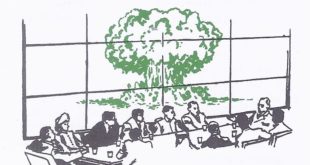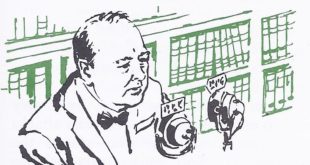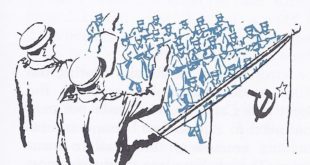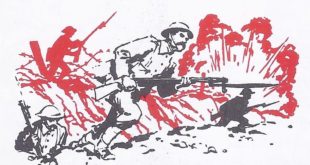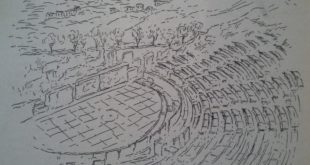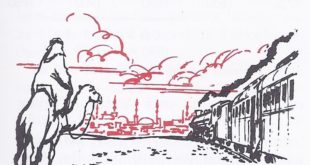The annual festival of the Great Dionysia, in March of the year 468, was not only remarkable for the victory of twenty-seven year old Sophocles over the honoured and battle-scarred Aeschylus, who was now approaching sixty. There was something else. Owing to the excitement which the competition between youth and age had aroused, the official whose duty it was to appoint the judges had not yet dared to do so. He was about to solve the problem in the way Athens solved many problems — by drawing lots — when Cimon, an aristocrat, politician and admiral, entered the great open-air …
Read More »Postwar World Looks for Ways to Live at Peace
The postwar stirring of nationalism among peoples in Asia and Africa, was one important outcome of World War 2, but World War 2 created another great yearning that was world-wide, the desire for a firm and lasting peace. This greatest of all conflicts had uprooted millions from their homes, destroying their means of livelihood. It had brought death, sorrow and a great war-weariness. News of the Allied victory in 1945 was received in a spirit of quiet relief and hope for the future. Following World War 2 a split developed between the free world (designated by the NATO flag) and …
Read More »Nationalist Beliefs in Asia and Africa after WW 2
Nationalist beliefs in Asia and Africa swept over changes in many lands. In the spring of 1955, the city of Bandung, Indonesia, was tense with excitement. Crowds lined the streets to catch glimpses of delegates attending an international conference. The citizens of Bandung saw Arab diplomats arrive, dressed in the flowing robes and headdress of the desert. They saw prime ministers and foreign ministers wearing the jaunty caps and spotless white clothing popular in tropical South Asia. The rest of the world watched too, for the Bandung Conference was the first of its kind ever to be held. Only Asian …
Read More »Aggressor Nations Fail to Achieve World Conquest
It was summer in 1939, vacation time for lots of people. No one knows how many Americans heard the voice of the British statesman Winston Churchill coming over the air on August 8, less than a month before World War 2 began. His words were grim, prophetic and weighted with bitter humour. “Holiday time, ladies and gentlemen! Holiday time, my friends across the Atlantic! Holiday time, when the summer calls the toilers of all countries for an all too brief spell from the offices and mills and stiff routine of daily life and bread-winning and sends them to seek, if not rest, at …
Read More »Dictators in Germany and Italy Challenge Democracies
Dictators came to power in many European countries during the twenty years following World War I. About 9:20 P.M. on February 27, 1933, the rumble and clang of fire engines echoed through the heart of Berlin, capital city of Germany. Down the broad avenue called Unter den Linden the trucks roared toward the Reichstag building where the German legislature met, but the firemen were too late; they could not check the flames which licked savagely from the windows. Within a few hours the big building was no more than a smoke-stained skeleton. The Reichstag fire was a grim prophecy of what lay ahead for Germany. …
Read More »Russia Becomes a Communist Dictatorship
When the United States entered World War 1, President Wilson had stated that America’s aim in taking up arms was “to make the world safe for democracy.” The first results of the war seemed to show that this attempt had succeeded. Old empires had crumbled and new republics had risen from their ruins. Democratic constitutions were adopted in most of the countries which the war had created or remodeled, but this apparent victory for democracy did not last, even though kings did not return to power as they had in 1815 after Napoleon’s defeat. What happened was that the kings …
Read More »World War I and the Peace that Failed
The soldier stood on the muddy “fire step” that reached, shelflike, the length of the deep trench. It was too dark to see his tired, mud-smirched face or to judge how old he was. He wore a steel helmet or “tin hat” and the khaki coloured blouse, pants and spiral leggings of the British Expeditionary Force. The barrel of his Enfield rifle rested on the top of a sodden sandbag. Tensely he crouched, his head thrust forward and turned slightly to the right, the better to hear with. His squinting eyes bored into the foggy gray of pre-dawn light. If …
Read More »Aeschylus
Play-acting had been developing at Athens since Peisistratus had introduced the Dionysia and the Panathenaea festivals; but to call it play-acting in the early stages gives a false impression. It was more like open air opera and ballet with a strong religious flavour. Originally there was a “chorus” of fifty men who chanted and danced in a dignified way. In the intervals an actor recited. Aeschylus added a second actor and the two actors, as well as conversing with each other, conversed with the chorus or its leader. All wore masks and impressive robes. Several plays were performed one after …
Read More »Imperialism Affects the Moslem World
Slowly the train had puffed over the heights of the Lebanon Mountains. Now, at last, it was coasting down the eastern slope. Hasan Ali, an Arab trader, gazed ahead down onto the broad Syrian plains far below. Already in the growing light of early morning he could make out some of the tall minarets of the 300 mosques in Damascus. Hasan Ali had first looked on the ancient city many years before when he was a boy. He and his father had joined the great caravan which yearly wound its way from Damascus across the Arabian Desert to Mecca, the …
Read More »The British Empire Becomes the Commonwealth of Nations
On a January evening in 1896, a famous British statesman, Joseph Chamberlain, attended a banquet in honour of an Englishman about to go to Australia as a colonial governor. Chamberlain was called upon to make an after dinner speech. What he said that wintry evening years ago explains what people at that time meant by the “British Empire” and points to the changes which he hoped would take place in the future. Here is part of what Chamberlain said: I have heard it said that we [English] never had a colonial policy, that we have simply blundered into all the …
Read More »
